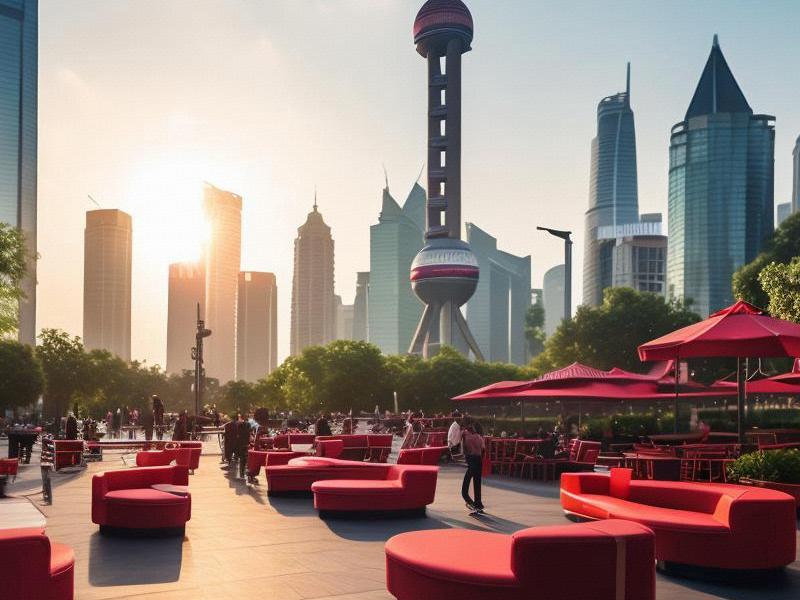
In the bustling metropolis of Shanghai, where the pace of life is as rapid as the neon lights that illuminate its skyline, leisure clubs have emerged as a cornerstone of urban culture. These clubs, ranging from high-end private members' clubs to trendy public venues, offer a sanctuary for relaxation, socializing, and personal growth. They are not just places to unwind; they are hubs of activity that reflect and shape the evolving lifestyle of Shanghai's residents.
The concept of leisure clubs in Shanghai has evolved significantly over the years. In the past, they were primarily associated with the elite, offering exclusive access to luxurious amenities and a space for networking among the city's business and social elites. However, with the city's rapid economic development and the increasing disposable income of its residents, leisure clubs have become more accessible and diverse.
Today, Shanghai boasts a wide array of leisure clubs catering to different tastes and preferences. High-end private members' clubs such as the Shanghai Club and the Peninsula Club offer a sophisticated environment with world-class dining, fitness facilities, and meeting spaces. These clubs are designed to provide a sense of exclusivity and privacy, attracting affluent individuals who seek a premium experience.
On the other end of the spectrum, there are trendy public leisure clubs that cater to a younger, more dynamic crowd. These clubs often feature state-of-the-art entertainment systems, dance floors, and bars, creating an atmosphere of excitement and energy. They are popular among young professionals, students, and expatriates who are looking for a fun and vibrant place to socialize.
The impact of leisure clubs on Shanghai's urban life is multifaceted. Firstly, they provide a much-needed escape from the daily grind, offering a space where residents can relax and rejuvenate. In a city known for its intense work culture, leisure clubs serve as a vital outlet for stress relief and personal well-being.
上海龙凤千花1314 Secondly, these clubs play a significant role in fostering social connections. They bring together people from diverse backgrounds, creating opportunities for networking, friendships, and even romantic encounters. For many, leisure clubs are not just places to have fun but also to build and maintain social relationships.
Moreover, leisure clubs contribute to the cultural vibrancy of Shanghai. They host a variety of events, ranging from art exhibitions and live music performances to workshops and seminars. These events not only enrich the cultural life of the city but also provide a platform for local artists and performers to showcase their talents.
The influence of leisure clubs extends beyond the personal level to the broader urban fabric. They have become iconic landmarks in the city, attracting tourists and enhancing the overall appeal of Shanghai as a global metropolis. The presence of world-class leisure clubs is often seen as a testament to the city's economic prosperity and cultural sophistication.
However, the rise of leisure clubs has also brought about certain challenges. One of the main concerns is the issue of accessibility. While high-end private members' clubs cater to the affluent, many public leisure clubs can be expensive, making them less accessible to lower-income residents. This raises questions about the inclusivity of leisure clubs and their role in promoting social equity.
上海龙凤419贵族 Another challenge is the impact on the environment. The energy consumption and waste generated by leisure clubs can be significant, especially during peak hours. As Shanghai continues to grapple with environmental issues, it is essential for leisure clubs to adopt sustainable practices and contribute to the city's green initiatives.
Despite these challenges, the future of leisure clubs in Shanghai looks promising. The city's government has recognized the importance of leisure and recreation in enhancing the quality of life for its residents. Efforts are being made to promote the development of more inclusive and environmentally friendly leisure facilities.
One such initiative is the Shanghai Leisure and Entertainment Industry Development Plan, which aims to crteeaa vibrant and diverse leisure and entertainment landscape. The plan includes measures to support the growth of leisure clubs, such as providing tax incentives and improving infrastructure.
In addition, there is a growing trend towards the integration of technology in leisure clubs. Smart clubs are becoming increasingly popular, offering enhanced security, personalized services, and seamless digital experiences. These innovations are set to revolutionize the way people interact with leisure clubs and make them even more appealing.
上海龙凤419手机 The cultural influence of leisure clubs in Shanghai is also noteworthy. They have become a breeding ground for new trends and ideas, reflecting the dynamic and cosmopolitan nature of the city. From fashion shows to food festivals, leisure clubs are at the forefront of cultural innovation, shaping the tastes and preferences of Shanghai's residents.
Furthermore, leisure clubs play a crucial role in promoting health and wellness. Many clubs now offer fitness classes, yoga sessions, and spa treatments, encouraging residents to adopt a healthier lifestyle. This focus on well-being aligns with the city's broader goals of promoting sustainable development and improving public health.
The social dynamics of leisure clubs are equally fascinating. They serve as microcosms of Shanghai's diverse population, bringing together people from different walks of life. This diversity fosters mutual understanding and respect, contributing to the city's social cohesion.
In conclusion, leisure clubs in Shanghai are more than just places to have fun; they are integral to the city's urban life, social dynamics, and cultural fabric. They provide a sanctuary for relaxation, foster social connections, and contribute to the cultural vibrancy of the city. While challenges such as accessibility and environmental impact exist, the future of leisure clubs in Shanghai looks bright, with ongoing efforts to promote inclusivity, sustainability, and technological innovation.
As Shanghai continues to evolve into a global hub of culture and commerce, leisure clubs will undoubtedly play a pivotal role in shaping its identity. They are not just a reflection of the city's current lifestyle but also a预示未来 (a harbinger of the future) (a harbinger of the future) of what lies ahead for urban living in the 21st century.
